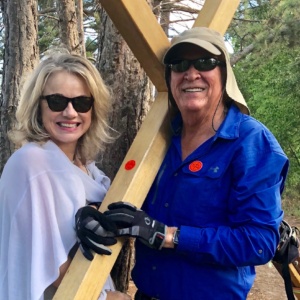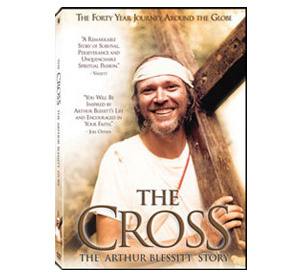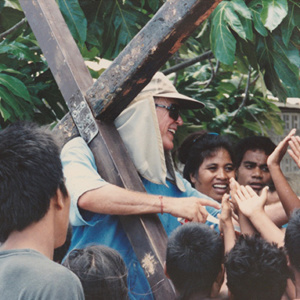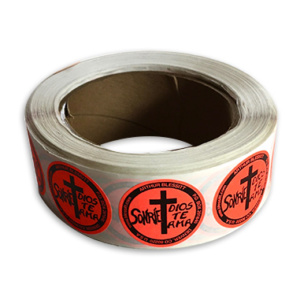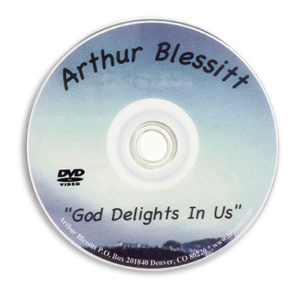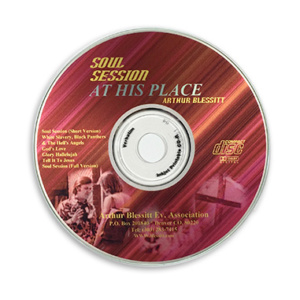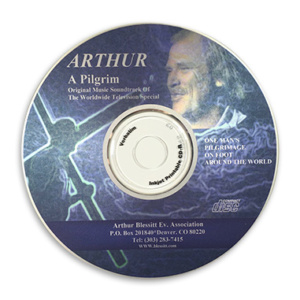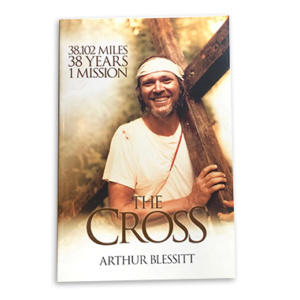HIS PLACE
YOU MEAN you’d preach the Gospel like Billy Graham?”
“More like Arthur Blessitt.”
I was talking with Bill Gazzarri, the proprietor of Hollywood-A-Go-Go, the flagship teen-age hangout on the Boulevard. In making my rounds, I had met and talked a dozen times with Bill, a rugged, gray-haired man who looked at the world through alert, dark eyes. In the name of Jesus, I had nagged Bill almost to death, pleading with him to take the unprecedented step of letting a minister tell the kids the good news of Christ from the stage of a nightclub. At first he would unceremoniously throw me out, but I kept coming back and I was gradually wearing him down.
Bill was all straight, a businessman who’d been capitalizing on the teen-age invasion of the Boulevard for years, serving up hard rock, running dance contests for prize money, and featuring the kids in a dance-rock format on a widely watched local TV show. He also advertised his attractions heavily.
“Jesus at the Hollywood-A-Go-Go. I don’t think it would mix,” Bill said.
“Your midweek crowds are down. Give me a Tuesday evening, your slowest night, and I guarantee I’ll pack the place for you. And no charge. You have nothing to lose.”
“What if you bomb?”
I was proceeding on the assumption that God wouldn’t let me wash out. He had always been at my side when I preached in church. Why would He desert me for spreading His message from a nightclub stage?
Perhaps too grandiloquently, I promised Bill, “You’ll have more kids in here than you can handle.”
“I’ve had every other type of attraction. Why not a minister? Okay, Arthur.”
Once Bill agreed he did everything possible to ensure a crowd. He put my name on his marquee: “SEE AND HEAR ARTHUR BLESSITT TURN YOU ON WITH THE GOSPEL.” He also advertised my appearance on Boulevard billboards, in several college newspapers, and on KHJ, the strident rock radio station most of the kids listen to in Los Angeles.
Bill had given me two hours to fill, from 10 p.m. to midnight. I arranged for several singing groups to perform, including the pretty Sunshine Sisters, who had sung gospel all over America and had made a tremendous impact in Brazil and the Middle East with their songs for the Lord. The other groups, specializing in psychedelic and soul gospel, were The New Creatures, The Disciples, and The Singing Stair Steps. I also arranged for two teenagers to give their testimonies, a former prostitute and a one-time junkie. I had led them both to Christ.
Tuesday night rolled around and I was quivering inside, wondering if the kids would come. I paced backstage and a moment before I was to go on I pecked out at the room.
It was jammed; standing room only!
Bill was in rapture. So was I.
Was any further evidence needed that kids could groove on the Gospel?
I preached on Life’s Greatest Trip, urging the kids to let Jesus turn them on instead of drugs. Drop out of slavery to sin. Kick pot, acid, and speed. Be really free, be really happy.
The combination of singing, testimonies, and preaching scored solidly with the kids.
The entire evening was out of sight.
Bill was almost speechless. “Arthur, will you come back?”
I came back for six more rallies, and the kids came too.
Word that the Gospel had successfully invaded the Boulevard reached the news department at CBS television. Ralph Story, host of a popular West Coast program, devoted most of his half-hour show to the “swinging preacher” of Sunset Boulevard. Then a five-minute feature about my work was carried on a national newscast. As soon as it was aired, my phone began ringing off the wall. A bevy of Hollywood agents a breed I had never encountered before and would prefer to avoid in the future came to me with fantastic offers.
A radio show. A television show. Las Vegas. San Francisco. A coast-to-coast nightclub tour.
$1,000 a night: $1,500 a night. $2,500 a night, plus a percentage of the gross.
The refrigerator in our apartment held little more than peanut butter and jelly, and that kind of money sounded incredible, until I discovered what I had to do to earn it.
Each of the agents had about the same idea. They wanted me to preach to whiskey-sodden straights in nightclubs, but they also wanted to make a freak and an entertainer out of me.
They had no conception or understanding of my one abiding interest — winning souls for Christ. I didn’t want to be bartered and sold like a dirty-mouthed comedian or a nightclub dancer. I didn’t want to be exploited in that manner. That wasn’t truly witnessing for Christ; that was selling Him out.
I went to dinner with one of the agents, and I talked about Jesus.
“Great, kid, you do your Jesus thing.” Then he began talking money and percentages.
“I don’t want to be paid for preaching in a nightclub.”
“Sure, fine, okay. We’ll call it a donation. You won’t make a dime. It will all go into your Association.” He winked at me as if we were conspirators in a con game with Christ as the sucker. The agent wouldn’t care if I were selling dog food so long as I could make a profit for him. The agility of his scheming mind was incredible. He had a dozen ideas, each one more atrociously conniving than the last. I told him I’d starve to death before agreeing to anything be proposed. As I got up to leave he looked at me with startled eyes. “This Jesus thing of yours is Fort Knox, your own money-making machine.”
Another agent, a lady in a wide-brimmed hat, read me her client list, some of Hollywood’s most successful actors. She offered to represent me for six months without taking a commission. When I asked a musician friend how she could afford such an arrangement, he told me, “She’ll get a kickback from the club owners every place you appear.”
On that basis, God’s message was not for sale. I swept the agents out of my life as Christ had the money changers from the temple.
The last time I talked to the lady agent she said, “You’re throwing away a million-dollar career.”
She still wasn’t tuned in on my wavelength.
My call, my obsession, was to continue my ministry to the kids on the Boulevard. Here there was need, here there was challenge, here there were great victories waiting to be won for Christ. Here there must be a church for the dispossessed young.
After months of hunting, I finally found a building on the Boulevard that rented for four hundred dollars a month. It was a series of small rooms, and I had really wanted a bigger main room in which I could preach to a large crowd. Though far from ideal, it was the best location available. I decided to rent it. The day before I was to sign the lease, I was driving down the Boulevard and saw a “For Rent” sign at 9109 Sunset. I slammed on my brakes and anxiously called the broker who had the listing.
The building was a two-story affair. Part of it had once been used as a recording studio. It was in abominable shape, with banged up walls and doors and old dirty curtains barely hiding the grime of unwashed windows. But I could see the upstairs as a prayer room, and the main room downstairs would be large enough to hold scores of kids.
This was it!
The owner wanted six hundred dollars a month and an unbreakable five-year lease. The rent, to say nothing of a hard five-year commitment, was a heavy, chancy load. The owner did agree to a one-year lease but in view of what was to come later I should have grabbed the opportunity to tie up the building for five years.
The only problem now was that I had to have the first and last month’s rent twelve hundred dollars in twenty-four hours.
It seemed hopeless until I remembered the name of a man who had sent word to me that he was interested in my work and that if I decided to start a church on the Boulevard, he would be glad to help. He was a fine Christian and a first vice-president of a leading Beverly Hills stock brokerage firm.
I phoned him the morning the money was due and told him about the building.
“When do you need the money?”
“In an hour.”
“What are you going to do?”
“I’m going to write a check for twelve hundred dollars.”
“But it will bounce. A minister doesn’t go round writing phony checks.”
“It won’t clear until tomorrow. I don’t know how, but God will provide the money because He wants us on the Sunset Boulevard.”
“You really believe that?”
“Yes, sir. Nothing can stand in our way.”
I heard a deep breath on the phone. “All right, you have your thousand dollars. Go ahead and write the check.”
Christ now was part of the Boulevard scene!
There wasn’t a dime to pay salaries to anyone, not a penny for food. We couldn’t afford to buy a light bulb or a nail.
But He had put it all together, and He has provided for us ever since, meeting our needs for rent, Bibles, tracts, and other expenses, sometimes at the last moment, but always He has been there in time.
Christ has blessed our Boulevard ministry, and as our work has become known, unsolicited contributions have come in through the mail. A few churches consider us a mission, as do several individuals, and this support, Divinely generated, has allowed us not only to survive, but to grow.
From the beginning, I decided that I would not waste time chasing after money. Only God, not the dollar, is Almighty. Through prayer and faith we have been sustained.
Free of concern about money, we are at liberty to carry out the command of Christ to save souls and help people.
We whip the building into shape there was Dale Larsen, whom I had met on the Boulevard. A graduate of the Detroit Bible College and a lay minister, Dale had also heard God’s call to do His work on Sunset Boulevard. He had come from Michigan for that express purpose and he was a welcome, soon indispensable, member of our Team. Our other staff member was Mike, a speed freak I had led to the Lord. Mike’s problems were primarily rooted in the bickering, short tempered atmosphere created in his home by his parents. To escape he had turned on. After he accepted Christ and worked with us for a while, he met a lovely girl, married, settled down, and avoided seeing his impossibly argumentative parents. Ironically, Mike’s mother was a Los Angeles County employee a social counselor paid to advise the parents of young lawbreakers after they were released from juvenile Hall!
We hammered, sawed, built, planned, and prayed nearly twenty-four hours a day, cleaning up the debris and getting our church ready. There weren’t any frills. We hand-painted a couple of posters for the walls: “SMILE, GOD LOVES YOU”; “TURN ON TO JESUS”; “REAL PEACE IS JESUS”; “GOD IS LOVE.” We painted the upstairs prayer room and placed a Bible on a battered old table. A few used cushions were the only other adornments. Downstairs we con- structed a foot-high stage and strung some colored lights.
We improvised and scrounged for furniture. In a rented U-Haul, Dale and I went to the telephone company’s warehouse in Santa Monica. We found a dozen giant discarded cable spools, and these, with a painted checkerboard on each, became our tables. We also found two weathered, abandoned telephone poles. We liked the wood. It had a rugged, used look.
From those poles, we carved our cross. We sallied through the back alleys behind carpet stores and from garbage cans we rescued a number of rugs for our floor. (When the rugs got really dirty and stained we threw them away. There wasn’t money to clean them. It was less expensive to go back to the alleys for a new supply.)
Opening day was suddenly upon us, and we were as ready as we would ever be, except for one thing.
We didn’t have a name for our church. To announce our opening we had ordered a supply of handbills which we were going to pass out up and down the Boulevard. The printer had come to the building and was waiting for us to decide on a name so he could complete the handbills.
The four of us brainstormed through dozens of names, including The Eternal Trip, The Lighthouse, The Door, The Temple.
None rang true.
The printer was tapping his foot impatiently. Perhaps we would have to open without a name.
“We need a name that celebrates God. This isn’t your place, my place, or even the kids’ place. It’s the Lord’s, it’s His place.”
His Place!
That rang true and clear.
“His Place, His Place,” I shouted. “We’ll call it “His Place.”
Our first night we expected perhaps fifteen to twenty-five kids. We had a sign in our window that promised free refreshments, but our only food was one loaf of bread and half a jar of peanut butter.
Nevertheless, we threw open the door at 7:30 p.m.
Into His Place, to our astonishment, streamed some 150 kids hippies, dopers, bikers, teeny- boppers, drag queens, pushers, hoods, and ladies of the night. A small army, all teenagers, who needed God in their lives.
With the possible exception of three or four kids, every youngster who came through the door was stoned on downers, speed, acid, or H. It seemed as if we were hosting one tremendous freak out.
A sort of controlled chaos reigned for a while. Then the kids settled down around the tables and started rapping. The four of us moved through the crowd, talking, witnessing, welcoming our flock.
Our food shortage was met when a number of Christian adults I don’t know how they heard of our opening or how they knew we needed food-arrived with armloads of peanut butter, jelly, and Kool-Aid. I had called a number of Jewish bakeries on Fairfax, and they came through with bags of bagels. The bagels have been a mainstay of the diet at His Place. The hard bread is a perfect snack for a doper whose trip is wearing off.
There were to be three confrontations during our first night. The manner in which they were met would determine whether His Place would earn a reputation as a church paying homage to God or a lunatic asylum in which various groups of kids would fight it out among themselves for control of our building. If that happened, not only would God be dishonored, but the sheriff would be certain to close us down.
The problem was, however, that the kids in His Place weren’t exactly altar boys or a choir of angels. The room was bubbling with laughter and conversation when the first trouble erupted.
About twenty kids, sitting smack in the center of the floor, began a loud chant, drowning out everyone else. It was a cacophonous, eerie sound, all-engulfing.
I went over to them and shouted for quiet. “What’s going on?”
“We’re Buddhists,” the spokesman said, “and we’re praying.”
“If you want to pray, you’ll have to move upstairs to our prayer room.
They climbed the steps, but in a moment the renewed sound of their chanting caromed downstairs. Again no one could hear himself think.
I ran up and found they had all joined hands while they continued their high-pitched prayer.
I again shouted for quiet. “I’m not telling you that you can’t pray to Buddha or anyone else. But in this room you have to pray in such a way that it doesn’t disturb anyone else.”
“It’s a free country; we have freedom of religion,” their spokesman said.
“This room is set aside for quiet prayer and silent meditation. I wouldn’t allow any Christian group to pray aloud either if they were disturbing others. That’s just the way things are going to be run around here.”
They filed sullenly out with no further argument.
About an hour later Dale came over to me and said, “There’s a gang of bikers in the prayer room smoking grass.”
When I reached the prayer room this time the door was locked from the inside.
“Open up.”
When there was no response I started pounding. I heard a hoarse voice cry, “Split, man, don’t mess with us.”
The odor of the grass, which has a distinct smell vaguely resembling incense, wafted through the door.
“You open up, or I’m going to pray my way in. I mean it.”
I heard the lock turn, and as I stepped inside I saw at least twenty bikers and their old ladies. There was also a suffocating cloud of smoke. The bikers were all flying their colors, and they looked touchy and hard-jawed.
“You’ll bust the whole place if you smoke grass in here. Put your joints out, and right now.”
“Who’s going to make us?” their hoarse-voiced leader said.
“God.”
“Who makes the rules around here?”
“I do.”
“You better split, Preacher, while you have the chance. Just let us alone, and when we’re through, we’ll go.”
“No. You have to leave now.” “You going to throw us out?” “Yes.”
A couple of the bikers’ old ladies giggled.
“How are you going to do it?”
“With God’s help. This is His house. You’re welcome as long as you behave. But pot smoking isn’t allowed. Like it or not, you have to leave now!”
Four of them came at me, and grabbed me by the shoulders and under my arms.
“You’re going out that window,” their angry leader declared.
The window of the prayer room led to a twenty-foot drop to the ground.
I knew the psychology of the bikers. Alone, no one of them was really tough, but in a pack they were like wolves. They wouldn’t chicken out. They were perfectly capable of murder.
“Before I go out that window, I want to pray.”
They loosened their grip on me as I sunk to my knees.
“In the name of Jesus Christ I ask that these young people be put under conviction. Stay their hands, Lord, strike them down if need be. Show them that Christ died on the cross for us and He rose again, that He is coming again, that you are Lord of lords, and this is Thy House which must be kept sacred in Thy name.”
When I finished, you could have heard the flutter of an eyelash.
Then in a low, quiet voice, the bikers’ leader said, “I can’t stand any more of this preaching. I’m splitting.”
One by one they left until I was alone. I was still on my knees.
The threats of the Buddhists and the bikers to the integrity of His Place had been surmounted. Far more insidious and dangerous was the problem of handling the pushers.
The heads and freaks were bunched together, a school of hungry sharks waiting for their pilot fish. Potentially, a dealer had a ready-made market at His Place. I had to be certain to harpoon any dealer who came through the door. One report to the sheriff that junk was being dealt at His Place might close us down.
The most artful, devilish, clever dealer on the Boulevard was Richard, a short cat with matted, curly hair. As I feared, His Place proved to be the flame; Richard, the predictable moth.
He came in on our first night with his band of about fifteen assistants, some of them chicks. Richard was another dealer who kept his junk hidden in the clothing of his chicks.
Shortly after he arrived, one of the kids whispered in my ear, “Richard’s dealing.”
I barreled over to him and laid the law down. “Man, you can’t push in here.”
Richard didn’t bother to deny he was dealing. Instead he justified it. “I couldn’t deal if the heads and freaks weren’t buying.”
“That doesn’t wash with me. Unless you give me your word that you and your whole bunch will stop dealing in here, I’ll call The Man.”
“Sure, Arthur,” he said with seeming sincerity, “you’ve got my word.”
But half an hour later Dale told me that kids were making buys from one of Richard’s chicks just outside our door.
I stepped out in time to see a bag of pills being exchanged for bread. I was furious.
Richard was rapping inside with some of the kids when I came storming up to him. “One of your chicks is pushing outside.”
“I gave you my word we wouldn’t deal in here, and we’re not.”
“Pushing a few feet from our door amounts to the same thing.” “What are you going to do about it?” Richard said truculently. “All of you split or I bring the sheriff in.”
“You can’t afford to call The Man. You know how the kids hate the cops. You call them in and you’ll alienate them all. You’ll just be another fink.”
“I’m not going to compete in a popularity contest with a pusher. Are you leaving or not?”
“No.”
I went to the phone and called the sheriff.
Richard, completely unconcerned, walked to our stage, sat down, and rested his head against our cross.
“You still have time to split,” I told Richard after hanging up the phone.
“This is a house of God, a sanctuary. They won’t bust me in here.”
“His Place isn’t a sanctuary for a rotten pill pusher who doesn’t have Jesus in his heart.”
Richard had given me a cunning argument. If I had him arrested for dealing, I would lose the trust of the kids and any hope of reaching them. Yet I couldn’t have him selling his junk in or near our premises.
I called for the attention of the kids. “I want everyone to know the police are coming and I’m going to ask them to arrest Richard. I’m giving him a chance to leave, but he refuses. I’m turning him in for dealing. But if we allow Richard to push stuff in here, His Place won’t be around much longer.”
When I finished, there was no positive or negative reaction from the kids. Apparently they were content to wait and see the outcome.
When two sheriff’s deputies arrived, I led them to Richard, who was still using our cross as a headrest.
“Officer, I want this fellow removed. He is disturbing the peace.”
“Outside,” one of the law men ordered. “We want to talk to you.”
Richard didn’t move a muscle.
“I’ll say it one more time,” the officer barked. “Are you going to step outside?”
When Richard still failed to stir, the officer reached for his handcuffs.
Now Richard nonchalantly stood up, brushing imaginary dirt from his buckskin jacket. Then ensued perhaps the most astonishing conversation I’ve ever heard. Richard, with a talent I never dreamed he possessed, turned in a dazzling performance. His act would have shamed Sir Laurence Olivier.
“Gentlemen,” he said to the sheriff’s men, “I guess this is the moment I have to surface. I’m a state narcotics bureau undercover man!”
It was pure poetry and the wide-eyed officers, incredibly, were buying every word.
“My assignment,” continued Richard, “was to check out Arthur Blessitt. The bureau had to see how far this man would go. We had to determine if he would really honor his commitment to God and the law, if he would drive a pusher from his temple. I can report that this man is cool. He is a true man of God. Take my word for it, you can trust Arthur Blessitt. Now I have to move on to my next assignment. This is just one of a number of locations I’m investigating. We’ve got to put these pushers out of business.”
With new respect in his voice, the officer who had barked at Richard asked, “Sir, do you have any official identification?”
Pure putty for Richard’s agile brain. “As a state narc, you should realize I can’t afford to carry any I.D.”
Then Richard, in slow, measured steps, marched unmolested out the door and into the night.
Richard was wasting his time pushing junk. He could have made a fortune selling the Brooklyn Bridge.
“I guess that wraps it up,” one of the lawmen said to his buddy. “Let’s take off.”
I watched them go, my mouth agape. I was awe-stricken and speechless.
Wave after wave of laughter rocked the room as the kids spread the story of how the biggest dope pusher on the Sunset Boulevard had outsmarted The Man.
I thought to myself that if Richard used his nimble mind for Christ, he’d be one of the greatest soul-winners in the history of the world.
Richard returned many times to His Place, but he never tried dealing again. He couldn’t pull the same charade twice. We became good friends, and Richard later put up the bail money for me after one of my arrests.
That first night at least four hundred kids came through our door. Some carried weapons. Some had bottles of booze. We quickly separated couples who tried to pair off in a corner and we nipped a few fights before real trouble could break out.
I preached at midnight and fifteen young people stepped up to receive the Savior.
At 4 a.m. we swept everybody out. Several homeless kids asked if they could crash till morning. We had to refuse since sleeping in the building overnight was specifically forbidden in our lease.
The first night had taught us a great deal. We drew up a set of rules for the future and hammered it to the front door:
1. No dope.
2. No alcohol.
3. No hassling.
4. No crashing.
5. No making out.
6. No guns, knives, or chains
Violators would be banned for thirty days.
Christ quickly won a special niche on the Boulevard. His Place caught on with the kids, caught on beyond my wildest hopes. It became the place to go. It was in. Hundreds trooped through our door each evening. On Friday and Saturday nights it was so jammed we had to empty the crowd into the street every few hours to permit a patiently waiting new bunch to enter.
Victory after victory was won for Him. Not a night passed without decisions being made for Jesus.
The “toilet service” became one of our His Place traditions. Whenever a doper gives his heart to Christ, we move him straight into the john. Once I counted eighteen bodies squeezed into our little bathroom.
“I don’t need this any more, I’m high on the Lord,” the typical convert declares. He pulls out his cache of grass, reds, speed, or acid and drops it into the bowl.
At each toilet service I read the soaring, life-changing verse from 2 Corinthians 5:17: “Therefore, if any man be in Christ, he is a new creation; old things are passed away; behold, all things are become new.”
This is followed by prayer and by the ex-doper giving his testimony.
And finally, as the handle is pressed, as the junk swirls away, we sing:
Down, down, down, down,
All my dope is gone.
Down, down, down, down,
All my dope is gone.
Among the junkies on the Boulevard, the word is still that His Place has the hottest head in town.
Our staff now was augmented by several new workers. Part of their job was to witness to people walking by on the street outside His Place.
So effective was their witnessing that our next-door neighbor, a club called The Session, one of the oldest clubs on the Boulevard, was forced to close. Too many straights just couldn’t bring themselves to go inside after bearing the Word of God.
The owner of The Session told me, “Arthur, you’ve cost me seventy-five thousand dollars!” With its closing, I was a marked man.


